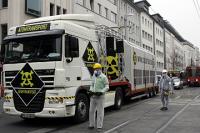Police are mobilising 19,000 officers to guard a shipment of nuclear waste from France to north Germany for storage at the end of this month. Scores of thousands of protesters are expected in and around the village of Gorleben. An “Occupy Police!“ call has gone out to gain from the momentum of that worldwide movement by mounting nuclear protests across the country to keep police busy and so weaken their presence in Gorleben. The Gorleben activist group told a news conference more than 170 coaches from across Germany were already booked to come to the main rally, which would reflect broad resistance by all age groups and walks of life.
Farmers of the area say they will again take part with hundreds of tractors, noting that 600 tractors were used last year to paralyse police supply and reinforcement logistics.
Police warned that there were expected to be around 300 “extremists” among the thousands of peaceful protesters who would be dealt with sternly if they tried violence.
Eleven CASTOR caskets with German waste that was recycled in France are to set out by train from Normandy on 24 November. French activists plan to hold it up shortly after it starts rolling.
As well as storage of waste in Gorleben and a disused mine nearby, protesters will also oppose the continued operation of nine nuclear power stations in Germany and other nuclear facilities, such as expanding uranium enrichment and production of nuclear fuels.
The protests are taking place amid public debate about planned new legislation on determining a final was repository. Opponents claim the planned law will confirm a geologically highly risky salt deposit in Gorleben as the final storage place. They rubbish government claims that there’s a ‘blank map’ for the search.
Before the real CASTOR shipment begins, one group of protesters has been running a low-loader truck with a make-believe CASTOR more or less along the rail route to draw attention to the protests.
Mainstream German media coverage
Tip of an iceberg
A study commissioned by The Greens in the German parliament has found that half a million transports of nuclear materials are done in the country every year. Almost 10,000 are directly or indirectly connected with nuclear power production. The study says the potential danger of these is markedly greater than that of the other 490,000. There are 12 locations of operating or closed down nuclear power stations and 21 locations of other nuclear installations involved as points of departure or destinations of radioactive materials used in power production. Additionally, radioactive materials for power production transit through Germany from and to other European and overseas countries

